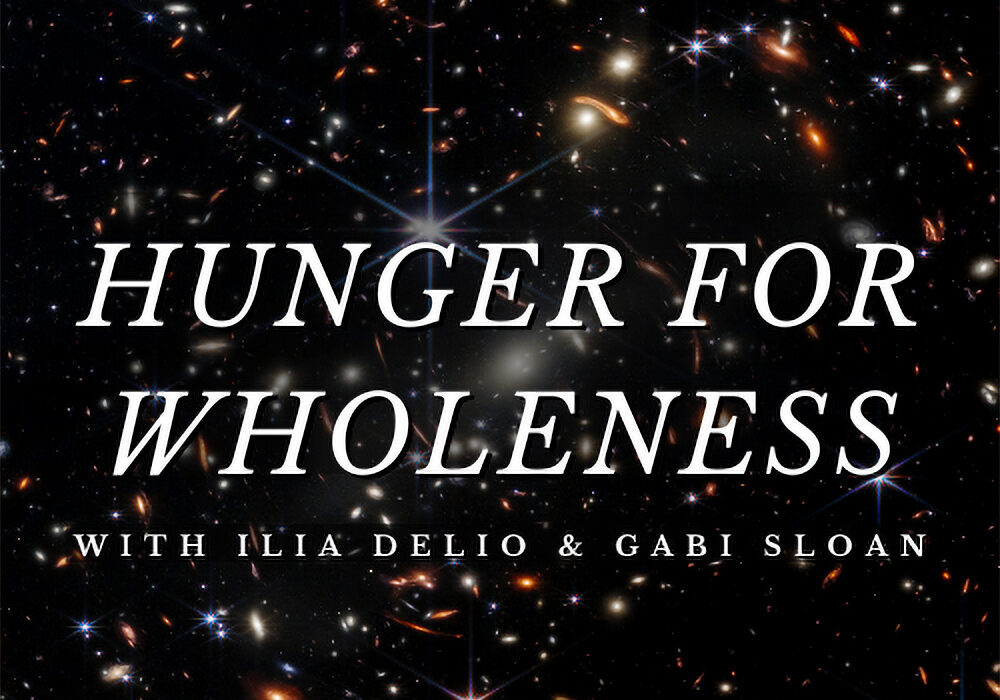Being as Love
Q: “St. Thomas Aquinas focuses on God as the ground of Being. Is there any similarity with Teilhard’s message with Being at the heart of life? Also I love the Reflection of St. Francis on the baby Jesus and the Crib and to seeing the humble Christ. Pope Francis tries to give us a message and in humility. Is the Catholic Pope a follower of Teilhard? We are all one including the Earth and need to care for each and the Earth.”
 Ilia: Who is God and what is the relation of God to all that exists? The Judeo-Christian tradition of divine revelation is found in the encounter of the burning bush (Exodus 3:14). Moses asks for God’s name: who shall I say sent me? God replies with a sentence, Yahweh asher Yahweh. This is a first person sentence that can be translated, “I am who I am,” or perhaps, “I will be who I will be,” or “I cause to be what I cause to be.” We really don’t know the exact meaning but it has something to do with “being.” Moses converts the response into a third-person formula: he will be who he will be, or he is who he is: “Yahweh asher Yahweh.” Hence, God’s answer to the question “who shall I say sent me?” is “Yahweh asher Yahweh” which is shortened to “Yahweh.” Some have argued that the name Yahweh expresses the quality of being, an active, dynamic being. What God does not do is disclose a first person identity so that we do not confuse a particular being with Being itself.
Ilia: Who is God and what is the relation of God to all that exists? The Judeo-Christian tradition of divine revelation is found in the encounter of the burning bush (Exodus 3:14). Moses asks for God’s name: who shall I say sent me? God replies with a sentence, Yahweh asher Yahweh. This is a first person sentence that can be translated, “I am who I am,” or perhaps, “I will be who I will be,” or “I cause to be what I cause to be.” We really don’t know the exact meaning but it has something to do with “being.” Moses converts the response into a third-person formula: he will be who he will be, or he is who he is: “Yahweh asher Yahweh.” Hence, God’s answer to the question “who shall I say sent me?” is “Yahweh asher Yahweh” which is shortened to “Yahweh.” Some have argued that the name Yahweh expresses the quality of being, an active, dynamic being. What God does not do is disclose a first person identity so that we do not confuse a particular being with Being itself.
God is the name of mystery that lies at the root of all that exists. Lutheran theologian Paul Tillich said that there lies beneath the surface an infinite and exhaustible dimension of depth. It is the experienced ultimacy of being and meaning. It is the realm of ultimate concern. The name of this infinite and inexhaustible depth is God. God is not something that can be proved or disproved. God does not merely exist; rather, God is existence. To argue that God exists is to deny God. We cannot grasp God in the same way that we cannot grasp existence itself. The reality of God lies beyond the limits of what can be grasped in the present. God is the ungraspable openness of life, that is, the divine is not a projection but the excess of life. In this respect, the name God points to the excess of life in the present moment; God is the name of the infinite and inexhaustible future. The future is not only abyss or an infinite unknown but the promise of ultimate fulfillment. We are driven by hope for an absolute future because we are in some mysterious way grasped by God.
Thomas of Aquinas had an understanding of God rooted in Aristotle’s notion of being. Being (esse) is the act of existing meaning that a thing is. It is distinguished from essence which explains what a thing is and which stands in relationship to esse as potentiality to act. God is subsistent ‘to be’ itself (ipsum esse subsistens) and as such is the immediate source of existence in all things.[i] God who is absolute Being gives Being to being and as such is Creator, cause and goal of all that exists. Creation is not a kind of medium between God and creatures by which God brings creatures into existence; rather, the act of creation is Godself. God is immediately and most intimately present to the creature as the source of its being.[ii]
The medieval Franciscan theologian Bonaventure looked to the incarnation as a distinct Christian understanding of God and identified God’s being as God’s goodness, since Jesus said, “no one is good but God alone” (Lk 18:19). Goodness is relational, personal and self-communicative and the highest good is love. Bonaventure speaks of love as the essence of God whereby the fountain fullness of love (the “Father”) overflows in love to one who perfectly expresses the Father, namely, the Son/Word and the bond between these divine persons in love is the Holy Spirit. Hence God is a Trinity of love who is self-giving, personal and relational. Thus God’s ultimate reality cannot be located in substance (what it is in itself) but only in personhood: what God is toward another. God exists as the mystery of persons in communion and only in communion can God exist at all. Since love produces communion among persons, love causes God to be who God is.”[iii] Hence God is the most dynamic, most relational, most unitive and most personal love, and since God’s essence is existence, that which exists is relational, personal and self-communicative love.
Teilhard de Chardin did not expound a theology of God as love but describes love as the most mysterious core energy at the heart of cosmic life: “Love is the most universal, the most tremendous and the most mysterious of the cosmic forces,”[iv] he wrote, “the physical structure of the universe is love.”[v] By this he indicated there is an irresistible and unyielding force of attraction in the universe with a specific character of personal, center-to-center attraction, which he called “love-energy.” Love-energy is anti-entropic, present from the Big Bang onwards though indistinguishable from molecular forces. “Even among the molecules,” he wrote, “love was the building power that worked against entropy, and under its attraction the elements groped their way towards union.”[vi] Love draws together and unites and, in uniting, it differentiates. Love energy is intrinsically relational, the affinity of being with being in a personal, centered way. If there was no internal propensity to unite, even at the level of the molecule itself—it would be physically impossible for love to appear higher up in human form. Since love is an intrinsic force of attraction, union is the end toward which each being directs itself. To be is to be united. If being is intrinsically relational then nothing exists independently or autonomously. Rather, “to be” is “to be with.” Reality is “being with another” in a way open to more being. Being is existence towards another; it is relational and exists for the sake of giving. I do not exist in order that I may possess; rather I exist in order that I may give of myself, for it is in giving that I am myself. Cosmic life is intrinsically relational because it is grounded in love.
For too long we have reduced love to sentiment or emotion when in fact this deep personal energy of attraction is the mark of divinity and all cosmic life. Creation is not a demonstration of divine power; rather creation expresses the dynamism of divine love. Creation is neither chance nor necessity; it is God’s destiny.[vii] God does what God is –what is true to God’s nature and thus what is divine. Because God is love, divine life is essentially creative and actualizes itself in inexhaustible abundance. God is not divine substance controlling creation but the radical subject of everything that exists. God loves the world with the very same love with which God is. God’s love fills up each being as “this” particular expression of love. Since no one finite being can adequately express the fullness of divine love, the excess of God’s love spills over everything that exists as its future. Transcendence is the fecundity of love, the “yearning” of everything that exists for the fullness of love. Teilhard calls this power of attractive love, God-Omega. God who is Love is the power of everything that exists, the fecundity of love, the future of all being-in-love. Another name for God is “ever newness in love.” If divine love is the root reality of all that exists, then suffering, violence and death ultimately cannot destroy life; rather, these are taken up and transformed into what is enduring and everlasting, the beauty of self-gift in the ongoing creativity of divine love.
Notes
[i] Aquinas’ works are cited from Thomas Aquinas, Opera omnia ut sunt in Indice Thomistico cum hypertextibus in CD-ROM [ITOO], cur. Robert Busa, SJ, (Trend, 1996). For a complete list of references to The Book of Causes in Aquinas’ other works, see C. Vansteenkiste, O.P., “Il Liber de Causis negli scritti di San Tommaso,’ Angelicum, 35(1958), pp. 325 – 74. The list is reprinted in Commentary, pp.169-78.
[ii] ST I, 45, 3, co. cf: I, 13, 7; I, 8, 1: “As long as a thing has being, God must be present to it, according to its mode of being. But being is innermost in each thing and most fundamentally inherent in all things. . . .Hence it must be that God is in all things, and innermostly.”
[iii]Michael Aksionov Meerson, The Trinity of Love in Modern Russian Theology (Quincy, IL: Franciscan Press, 1998), 4.
[iv] Teilhard de Chardin, Human Energy, 32.
[v] Teilhard de Chardin, Human Energy, 72.
[vi] King, Mysticism of Knowing, 104-05.
[vii] See Moltmann, 83.
 View print-friendly version
View print-friendly version
4 Comments
Related Posts

Hunger for Wholeness Podcast Launches!
Story matters. Our lives are shaped around immersive, powerful stories that thrive at the heart of our religious traditions, scientific inquiries, and cultural landscapes. All stories – big and small…


It took me some time to get used to the transition but is transforming everything. Love it 🙂
Ever deepening grateful for Ilia’s generous sharing of her insights and wisdom.
I am so grateful for this woman Ilia, midwife of the present-future.
I agree